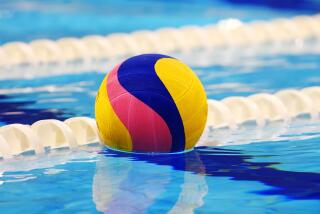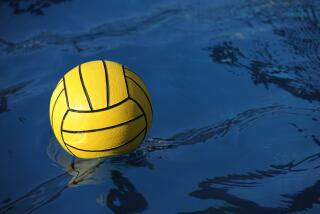Golden Chance for Revenge Tonight : U.S. Water Polo Team Plays Olympic Champion Yugoslavia
SAN DIEGO — The U.S. water polo team was fit to be tied after the 1984 Summer Olympics.
After blowing a 5-2 third-period lead in the championship game, the American team was tied, 5-5, by Yugoslavia.
Because overtime periods are not played in international water polo, Yugoslavia won the gold medal by having a better goal differential. Yugoslavia had defeated its opponents by 14 goals; the United States had a margin of nine goals.
“It was very difficult to walk away with a tie,” said U.S. national team captain Terry Schroeder. “Our team was the better team. I think they need to have an overtime period and change those rules.”
In a game of considerably less importance, but still spiced with emotion, the U.S. national team will face Yugoslavia tonight at 7:30 at the Canyonview pool at UC San Diego. Sunset San Diego will play the Newport Water Polo Foundation at 6.
Tonight’s match between Yugoslavia and the U.S. is the first of a four-game series between teams that surely will recognize one another.
The teams will play at Newport Harbor High in Newport Beach Saturday at 7 p.m., at the Belmont Plaza in Long Beach Sunday at 7:30 p.m. and at the McDonald Pool at USC next Wednesday at 3 p.m.
Yugoslavia’s young club has everyone back from the gold-medal team. The American club--made up primarily of Californians--has five of seven starters back from a team that gave the U.S. its best finish in Olympic water polo since 1904.
Winning the silver medal helped increase the popularity of the American water polo team. A team poster sold 50,000 copies during and after the Olympics and a number of players have made commercials.
Yet, the U.S. players still think of what might have been.
They remember that fourth quarter of the championship game when the U.S. team allowed two goals in the final four minutes. Suddenly, a 5-3 lead turned into a 5-5 tie.
“Subconsciously, we tried to protect the lead too much instead of continuing to go at them,” Schroeder said.
After Yugoslavia tied the score, the United States appeared to regain the lead on a goal by Schroeder with 40 seconds to play. However, the goal was disallowed when an offensive foul was called on one of Schroeder’s teammates.
“The ball came in to me and I was sure that the man guarding me had commited a major foul and would be ejected,” Schroeder said. “The referee blew the whistle and their guard headed toward the side. Their goalie was out of position and I shot it in the goal. Everyone at the pool thought the man had been ejected except the officials.”
Schroeder vividly remembers how the fans at Pepperdine University were cheering wildly after the game ended. And how his teammates walked to the medal stand with their heads down.
“The fans must have thought we were going to play an overtime period,” Schroeder said. “We knew that if we tied we were in trouble.”
Enough memories.
“Nobody really brings up that final game too much,” said Schroeder, who is reminded of the ’84 Games every time he sees the statue of himself outside the Los Angeles Memorial Coliseum. “We talk about the good times.”
And about the future.
The U.S. team is looking to the Goodwill Games in Moscow in July, the world water polo championships in Madrid, Spain, in August and the 1988 Olympics.
Throughout the past year, the U.S. team has trained and played international matches under new Coach Bill Barnett, a highly successful coach at Newport Harbor High who has also served as junior national coach. Barnett replaced 1984 Olympic Coach Monte Nitzkowski.
“The strategy is a little different (with a new coach),” Schroeder said, “and it takes a while to blend in with new players.”
One of the most highly regarded new players is Alan Mouchawar, a four-time National Collegiate Athletic Assn. All-American from Stanford who is in his fourth year of medical school at UC San Diego. Mouchawar opted not to play on the 1984 Olympic team. He felt the starting unit was set with players who were forced to sit out the 1980 Olympics because of the boycott.
“After the boycott,” Mouchawar said, “all the older guys were playing. Why beat a dead horse? I went to medical school.”
Playing with many of his former teammates from the junior national team, Mouchawar started most of the games at a tournament held in Marseilles, France, in early June. With four key players unable to make the trip because of job obligations, the U.S. team finished fifth in a six-team tournament. The U.S. lost to Yugoslavia, 8-7, on a goal scored with three seconds to play.
Ah, memories.
“They (Yugoslavia) have a very strong two-meter game and they have good outside shooters,” Schroeder said. “But we have a lot of talent. As much, if not more, than the ’84 team.”
More to Read
Go beyond the scoreboard
Get the latest on L.A.'s teams in the daily Sports Report newsletter.
You may occasionally receive promotional content from the Los Angeles Times.





